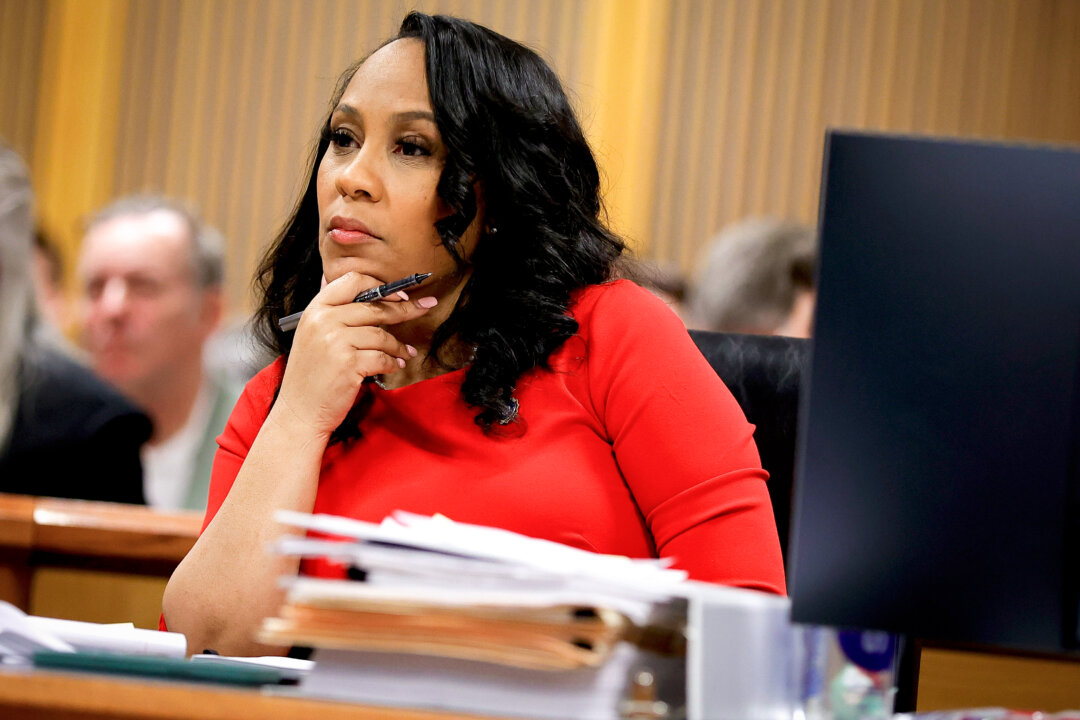The new date further indicates a trial won’t happen before the presidential election.
The Georgia Court of Appeals has set a hearing in October for former President Donald Trump’s appeal of a Fulton County judge’s decision not to disqualify prosecutor Fulton County District Attorney Fani Willis.
The defendants were notified to file their brief by June 23, and the district attorney has 20 days after that to file a reply brief. Oral arguments are scheduled for Oct. 4 before a three-judge panel.
President Trump and eight codefendants had appealed Fulton County Superior Court Judge Scott McAfee’s ruling that Ms. Willis would not be disqualified so long as Nathan Wade, the special attorney she contracted to lead the case, stepped down.
The state appeals court agreed on May 9 to review the decision and now possesses all materials related to the disqualification motion, including those from a sealed hearing.
Ms. Willis is prosecuting a racketeering case against the former president and 14 others, alleging that their challenge of the 2020 election results amounted to a criminal conspiracy.
The motion for disqualification had been filed in early January by defendant Michael Roman. He alleged an affair between Ms. Willis and Mr. Wade and misuse of funds, which set off several investigations of the district attorney’s office.
About half the codefendants joined the motion, raising additional arguments of prosecutorial misconduct.
Defendants challenging the disqualification ruling are Mr. Roman, President Trump, Rudy Giuliani, Mark Meadows, Jeffrey Clark, Robert Cheeley, David Shafer, Harrison Floyd, and Cathleen Latham.
Ms. Willis and Mr. Wade had acknowledged during an evidentiary hearing that they had engaged in an affair but disputed the timeline put forth by the defense. They stated that the relationship was no longer romantic when the indictment was handed up.
After the dramatic, days-long hearing, Judge McAfee found that the affair and surrounding controversy—which included the district attorney’s public statements—amounted to an appearance of impropriety but not misconduct or a conflict of interest.
He ruled that the appearance of impropriety could be remedied by the removal of one of them but not both Ms. Willis and Mr. Wade, but acknowledged the unusual situation. The judge then allowed the defendants to challenge his ruling in higher court, writing that he would continue to hear and rule on pretrial motions in the meantime.
The defendants argue that Judge McAfee made an error that now violates the defendants’ due process rights. Whether Ms. Willis and her office remain on the case is likely the deciding factor in whether the case will be tried at all.
Allegations of Prejudice
Beyond the affair that initiated the disqualification efforts, the defendants argue that Ms. Willis’s extrajudicial statements are disqualifying forensic misconduct. Furthermore, they argue that her allegedly false testimony during the evidentiary hearing on the disqualification motion warrants disqualification.
Ms. Willis has been outspoken about the case, giving media interviews and public speeches in which she references the disqualification motion and the defendants.
In a highly publicized speech days after the motion was filed, Ms. Willis implied that the defendants were targeting her because of her race. She boasted about her “superstar” team with a “conviction rate of 95 percent,” which the defendants argue was implying that they were guilty before a trial and conviction.
Two weeks later, Ms. Willis gave an interview to writers working on a book about her as a “hard-charging” prosecutor going after a “rogue president.”
Soon after Judge McAffee’s decision not to disqualify her, Ms. Willis suggested in an interview with CNN that the defendants had tried to delay their case.
“I do think there are efforts to slow down this train, but the train is coming,” she said.
The defendants argued that she also failed to show any remorse, pointing to that interview.
“Let’s say it for the record, I’m not embarrassed by anything that I’ve done,” Ms. Willis said. “I guess my greatest crime is that I had a relationship with a man, but that’s not something I find embarrassing in any way.”
The defendants argue that the district attorney has “already significantly compromised Defendants’ due process rights.”
“No prosecutor has ever been so reckless and relentless in pursuit of personal gain that she provided endless pretrial interviews to the media, granted unprecedented pretrial access to the authors of a book, or attempted to distract from her disqualifying unethical behavior by publicly and wrongfully castigating Defendants as racists for exposing her, and proclaiming God has anointed her and was on her side,” they wrote.
They argued that extrajudicial pretrial comments are a primary example of forensic misconduct.
Testimony Raised Doubts
The defendants also argued that the district attorney’s allegedly false testimony has raised serious legal and ethical violations.
The trial court judge had in court and through his written opinion cast doubt on Ms. Willis’s testimony, saying that there was “potential untruthfulness” in her answers about the relationship with Mr. Wade.
Although Judge McAfee found the testimony lacking and acknowledged that the public may well have lingering doubts about the nature and timeline of the relationship, he ruled that it was not the court’s role to “ferret out every instance of potential dishonesty,” referring to other authorities such as the state ethics board and Georgia Bar.
“While all attorneys are officers of the court and have a duty of candor, prosecutors have a ‘heightened duty of candor to the courts and in fulfilling other professional obligations,’” the defendants wrote, citing ethical standards for prosecutors.
“Defendants submit that the DA’s untruthful testimony to protect her personal interests in this prosecution, over and at the expense of the case itself, is at the very least forensic misconduct.”

